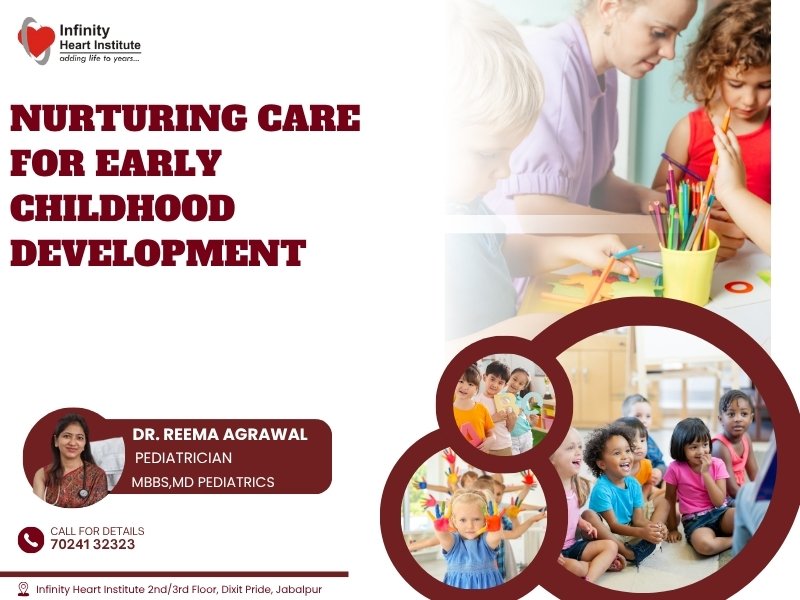As a pediatrician in Jabalpur, I often remind parents that the early years of a child’s life are like the foundation of a house — strong beginnings lead to strong futures. The love, care, and support we provide during the first five years shape a child’s physical health, emotional well-being, and learning abilities.
I’m Dr Reema Agrawal Pediatrician in Jabalpur at Infinity Heart Hospital, and through this article, I want to help parents understand how simple, loving care can make a world of difference in a child’s development.
Why Early Childhood Care Matters So Much
From birth to age five, a child’s brain grows faster than it ever will again. Every smile, touch, and word you share helps form millions of new brain connections.
When children receive nurturing care — which means love, attention, good nutrition, safety, and learning opportunities — they grow up healthier, happier, and more confident.
In my years of experience as Dr Reema Agrawal Pediatrician in Jabalpur, I’ve seen that the children who receive this kind of care early on tend to perform better in school and build stronger relationships later in life.
What Is Nurturing Care?
Many parents ask me what “nurturing care” actually means. It’s not about fancy toys or expensive schools — it’s about being there for your child with patience, love, and consistency.
Nurturing care has five key parts that I always explain to parents.
1. Good Health
Regular medical checkups, timely vaccinations, and early treatment are essential. Simple habits like washing hands, proper sleep, and healthy routines go a long way.
As Dr Reema Agrawal Pediatrician in Jabalpur, I always tell families — prevention is much easier than treatment.
2. Proper Nutrition
What your child eats directly affects their growth and intelligence. Give them a mix of vegetables, fruits, pulses, dairy, and whole grains. Try to reduce junk food and sugary drinks.
Healthy food builds immunity and supports brain development.
3. Responsive Care
When your child cries and you comfort them, they learn that the world is safe. When you talk and play with them, you strengthen their emotional security.
4. Early Learning
Everyday activities like reading stories, naming colors, or singing rhymes help your child learn language and thinking skills.
You are your child’s first and most important teacher.
5. Safety and Security
Children grow best in a secure environment — one where they feel protected, loved, and free to explore.
The Role of Parents in a Child’s Growth
No one knows a child better than their parents. You are their biggest teacher and supporter. I always tell parents — your attention means more than any toy or gadget.
Even 10–15 minutes of quality time a day — playing, talking, or just listening — strengthens your bond and boosts your child’s confidence.
At Infinity Heart Hospital, where I practice as Dr Reema Agrawal Pediatrician in Jabalpur, I help parents understand that nurturing doesn’t require perfection — only consistency and care.
Developmental Milestones Every Parent Should Know
Each child is different, but there are common milestones that show healthy growth.
0–1 Year
- Smiles and coos at familiar faces
- Rolls over, sits, and crawls
- Says simple words like “mama” or “papa”
1–3 Years
- Walks and runs
- Speaks short sentences
- Starts pretend play
- Eats with hands or spoon
3–5 Years
- Talks clearly and asks questions
- Recognizes colors, shapes, and numbers
- Plays in groups and learns to share
If you feel your child isn’t reaching these milestones on time, it’s important to consult your doctor early. As Dr Reema Agrawal Pediatrician in Jabalpur, I work closely with families to monitor each child’s physical and emotional growth.
Play: The Fun Way to Learn
Playtime is not just about fun — it’s your child’s way of exploring and understanding the world. When they build blocks, they learn problem-solving; when they draw, they develop creativity.
I encourage parents to let children play freely, especially outdoors. It helps build coordination, confidence, and social skills.
Nutrition: The Secret Ingredient of Growth
Food is fuel for your child’s growing mind and body.
Here’s what I tell parents at Infinity Heart Hospital:
- Breastfeed exclusively for the first 6 months.
- Introduce homemade soft foods after 6 months.
- Offer colorful fruits and vegetables daily.
- Avoid packed and fried snacks.
- Make mealtime happy not stressful.
As Dr Reema Agrawal Pediatrician in Jabalpur, I create growth-based diet plans that support both physical and mental development.
Emotional Love Builds Confidence
Children may forget your words, but they never forget how you make them feel. A warm hug, a smile, or gentle words of encouragement help them feel secure.
When children grow in love, they develop empathy, patience, and strength to face challenges. So, show affection often — it’s the best gift you can give.
How to Create a Happy and Secure Home
Here are some tips I share with parents during consultations:
- Keep a calm and loving atmosphere.
- Avoid shouting or harsh punishment.
- Praise your child’s small efforts.
- Maintain routines — children feel safe with predictability.
- Encourage curiosity — answer their “why” questions with patience.
These small habits build emotional balance and trust over time.
Regular Checkups: A Must for Growing Kids
Many parents visit me only when their child falls ill. But I always emphasize the importance of regular checkups — even when everything seems fine.
Routine visits help track growth, update vaccinations, and identify any delays early. Early intervention saves time, stress, and future complications.
At Infinity Heart Hospital, I, Dr Reema Agrawal Pediatrician in Jabalpur, conduct regular developmental and nutritional assessments for children to ensure they’re thriving in every way.
Frequently Asked Questions (FAQs)
Q1. How can I know if my child is developing normally?
Keep an eye on their physical, language, and social milestones. If you notice a delay, don’t wait — consult a pediatrician.
Q2. What’s the most important part of early development?
Emotional connection. A child who feels loved and supported learns faster and grows healthier.
Q3. How much screen time should I allow?
For children under 2 years — avoid screens. For older kids, less than one hour a day of good educational content is enough.
Q4. What should I do if my child is a picky eater?
Offer small, colorful meals. Don’t force-feed. Encourage them gently to try new foods.
Q5. When should I start regular visits to a pediatrician?
Within the first week after birth, then as recommended by your doctor. I advise checkups every few months during early years.
Q6. How can I make learning fun at home?
Talk, sing, read, and play together daily. Children learn best through simple activities and love.
Q7. What if my child throws tantrums?
Stay calm and patient. Tantrums often come from frustration or tiredness. Gentle guidance works better than anger.

